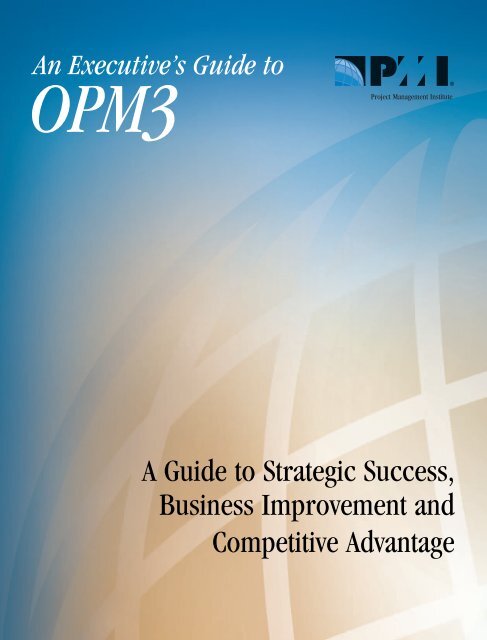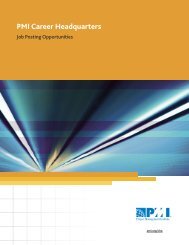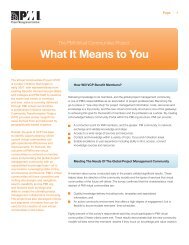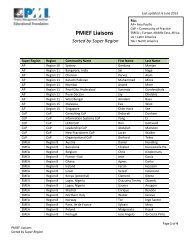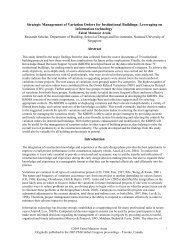Download the OPM3® Knowledge Foundation - Project ...
Download the OPM3® Knowledge Foundation - Project ...
Download the OPM3® Knowledge Foundation - Project ...
Create successful ePaper yourself
Turn your PDF publications into a flip-book with our unique Google optimized e-Paper software.
An Executive’s Guide to<br />
OPM3<br />
<strong>Project</strong> Management Institute<br />
A Guide to Strategic Success,<br />
Business Improvement and<br />
Competitive Advantage
An Executive’s Guide to<br />
OPM3<br />
Introduction<br />
To fully understand and appreciate <strong>the</strong><br />
relevance and importance of OPM3 in<br />
today's business and organizational<br />
environment, and how it can work within your<br />
organization, it might initially be helpful to recognize<br />
<strong>the</strong> vital role that projects and project management<br />
increasingly play within successful companies and<br />
organizations in <strong>the</strong> global marketplace.<br />
The work performed by organizations generally<br />
involves ei<strong>the</strong>r operations or projects, although <strong>the</strong><br />
two may overlap. Operations and projects share a<br />
number of characteristics in that <strong>the</strong>y are:<br />
Performed by people;<br />
Constrained by limited resources; and<br />
Planned, executed and controlled.<br />
<strong>Project</strong>s are often implemented as a means of<br />
achieving an organization's strategic plan and a<br />
response to requests that cannot be addressed within<br />
an organization's normal operational limits.<br />
They are initiated at all levels of an organization.<br />
With a definite beginning and end, projects are<br />
undertaken to create a unique product or service<br />
(according to A Guide to <strong>the</strong> <strong>Project</strong> Management Body of<br />
<strong>Knowledge</strong> (PMBOK ® Guide)). <strong>Project</strong>s may involve a<br />
single person or many thousands, and <strong>the</strong>ir duration<br />
can range from just a few short weeks to several<br />
years. They each have <strong>the</strong>ir own set of requirements<br />
that must be met by effective project management.<br />
What is project management?<br />
According to <strong>the</strong> PMBOK ® Guide, project<br />
management provides organizations with <strong>the</strong><br />
knowledge, skills, tools and techniques to help<br />
<strong>the</strong>m and <strong>the</strong>ir colleagues plan and execute projects<br />
on time and on budget. <strong>Project</strong> management<br />
is accomplished through <strong>the</strong> use of processes such<br />
as Initiating, Planning, Executing, Controlling,<br />
and Closing.<br />
Why organizations need project<br />
management<br />
With increasing competition within all industries<br />
and professions, organizations worldwide are<br />
embracing project management as a way of<br />
successfully completing projects, meeting business<br />
objectives and achieving organizational goals.<br />
Organizations such as IBM, AT&T, <strong>the</strong> United States<br />
Army and <strong>the</strong> National Aeronautics and Space<br />
Administration (NASA) employ project management.<br />
The potential benefits of project<br />
management<br />
Using project management:<br />
Effectively prioritizes projects to maximize<br />
efficiency;<br />
Clarifies project goals, problem areas and project<br />
risk to enhance project success;<br />
Consistently tracks tasks and milestones to<br />
better monitor potential outcomes;<br />
Expands communication among stakeholders;<br />
Decreases necessary resources to do <strong>the</strong> work<br />
through better refinement of resource requirements;<br />
Provides realistic performance measures; and<br />
Increases overall project performance, efficiency<br />
and effectiveness for better bottom line results.<br />
About PMI<br />
Established in 1969, <strong>the</strong> <strong>Project</strong> Management<br />
Institute (PMI) is <strong>the</strong> world's leading not-for-profit<br />
project management professional association with<br />
over 200,000 members in over 150 countries. PMI<br />
members are individuals who practice and study<br />
project management in many different industry<br />
areas, including aerospace, automotive, business<br />
management, construction, engineering, financial<br />
services, information technology, pharmaceuticals<br />
and telecommunications. Through a broad range of<br />
programs, products and services, PMI is <strong>the</strong><br />
world's premier resource for knowledge and<br />
information about project management.<br />
http://opm3online.pmi.org
An Executive’s Guide to<br />
OPM3<br />
What is Organizational <strong>Project</strong><br />
Management?<br />
Organizational project management is <strong>the</strong><br />
systematic management of projects,<br />
programs, and portfolios to achieve an<br />
organization's strategic goals.<br />
"Organization" can apply to an entire company or<br />
organization as well as to specific business units,<br />
functional groups, departments or sub-groups<br />
within <strong>the</strong> whole.<br />
Organizational project management focuses on<br />
<strong>the</strong> clear correlation between an organization's<br />
capabilities in <strong>the</strong> management of projects,<br />
programs and portfolios and its effective<br />
implementation of strategy, which directly impacts<br />
financial results.<br />
Successful organizational project management can<br />
be a decisive strategic advantage in a competitive<br />
economy. The degree to which an organization<br />
practices this type of project management is referred<br />
to as its organizational project management maturity.<br />
What is OPM3?<br />
Just as individuals benefit from achieving<br />
personal maturity, organizations can now benefit from<br />
achieving organizational project management maturity.<br />
Developed under <strong>the</strong> stewardship of PMI, OPM3 ®<br />
is an acronym for <strong>the</strong> Organizational <strong>Project</strong><br />
Management Maturity Model. It is a standard<br />
unlike any currently available tool or model and is<br />
delivered through a convenient online database<br />
accompanied by a book.<br />
OPM3 provides:<br />
<strong>Knowledge</strong> about organizational project<br />
management, organizational project management<br />
maturity, and what constitutes Best Practices in<br />
organizational project management;<br />
The ability to perform an Assessment of <strong>the</strong> current<br />
state of organizational project management maturity;<br />
Assistance to organizations who wish to identify<br />
a path for Improvement and decide to embark<br />
upon improvement to increase its project management<br />
maturity.<br />
It is through <strong>the</strong>se three interlocking elements—<br />
<strong>Knowledge</strong>, Assessment and Improvement—that<br />
OPM3 can enable an organization to improve its<br />
ability to achieve its strategic goals.<br />
The benefits of OPM3<br />
Now that you have a brief overview of OPM3, <strong>the</strong><br />
question you could ask is why is OPM3 important<br />
to my organization? Simply put, OPM3 provides a<br />
mechanism to advance your organization's strategic<br />
interests through <strong>the</strong> efficient and successful<br />
execution of projects.<br />
The three interlocking elements of OPM3—<br />
<strong>Knowledge</strong>, Assessment and Improvement—have<br />
<strong>the</strong> potential to create a new environment for<br />
organizations involved in project management by<br />
illuminating <strong>the</strong> important link between projects<br />
and business strategy and <strong>the</strong> importance of organizational<br />
support to project management practices.<br />
OPM3 will help organizations utilize project management<br />
to accomplish <strong>the</strong>ir goals on time, within<br />
budget, and most importantly, to improve <strong>the</strong>ir<br />
overall effectiveness.<br />
Figure 1: Elements of OPM3: <strong>Knowledge</strong>, Assessment<br />
and Improvement<br />
http://opm3online.pmi.org
An Executive’s Guide to<br />
OPM3<br />
What does OPM3 look like?<br />
OPM3 is an online application and<br />
book combination. The OPM3 ® <strong>Knowledge</strong><br />
<strong>Foundation</strong> book is intended to afford ease<br />
of reading for individuals and knowledge building<br />
for an organization. Along with a print version of<br />
<strong>the</strong> OPM3 <strong>Knowledge</strong> <strong>Foundation</strong>, OPM3 Online<br />
serves users through:<br />
A downloadable electronic version of <strong>the</strong> OPM3<br />
<strong>Knowledge</strong> <strong>Foundation</strong>;<br />
Electronic forms that begin new Assessments;<br />
A searchable database of Best Practices;<br />
Viewable Improvement Paths and Best Practices<br />
for completed Assessments.<br />
The Single-User Version, intended for use by one<br />
individual within an organization, includes access to<br />
OPM3 Online and one OPM3 <strong>Knowledge</strong> <strong>Foundation</strong><br />
book. The Multiple-User Version will allow several<br />
users from <strong>the</strong> same organization to access <strong>the</strong><br />
OPM3 Self-Assessment and will assist any organization's<br />
assessment champion by furnishing tools to<br />
manually compile assessment results.<br />
The OPM3 Single-User and Multiple-User<br />
Versions both contain OPM3's three interlocking<br />
elements—a quality that makes it unique in <strong>the</strong><br />
marketplace. The <strong>Knowledge</strong> element is presented<br />
in electronic file format in OPM3 Online<br />
(http://opm3online.pmi.org) and in <strong>the</strong> accompanying<br />
OPM3 <strong>Knowledge</strong> <strong>Foundation</strong> book, describing<br />
organizational project management, organizational<br />
project management maturity, relevant Best<br />
Practices and how to use OPM3, with various<br />
appendices and <strong>the</strong> full OPM3 Glossary—a wealth<br />
of practical information.<br />
The Assessment element allows organizations to<br />
use <strong>the</strong> OPM3 Self-Assessment, an interactive online<br />
database. OPM3 provides users with this interactive<br />
tool to compare <strong>the</strong> characteristics of <strong>the</strong>ir current<br />
state of organizational project management maturity<br />
with those key traits described by OPM3. Through<br />
self-assessment in relation to <strong>the</strong>se traits, an organization<br />
can quantify its own general maturity relative to<br />
<strong>the</strong> Capabilities that have been achieved. The OPM3<br />
Self-Assessment also helps <strong>the</strong> organization identify<br />
areas of strengths and weaknesses, in addition to<br />
where it stands on <strong>the</strong> continuum of organizational<br />
project management maturity.<br />
Based upon <strong>the</strong> results of an assessment and<br />
assuming an organization desires to achieve higher<br />
maturity, <strong>the</strong> organization would reference <strong>the</strong><br />
Improvement element of OPM3, also accessible<br />
through <strong>the</strong> online database on OPM3 Online. An<br />
organization may decide to pursue a course for<br />
improvement and, consequently, determine <strong>the</strong> Best<br />
Practices it wants to improve. Organizations may<br />
refer to OPM3 Online to view <strong>the</strong> series of<br />
Implementing OPM3 within your organization<br />
Capabilities leading to each Best Practice of interest to<br />
identify <strong>the</strong> prerequisites for progressing from <strong>the</strong>ir<br />
current state to an improved level of organizational<br />
project management maturity, while at <strong>the</strong> same time<br />
conserving limited organizational resources.<br />
Once an improvement plan has been established,<br />
<strong>the</strong> organization would implement appropriate<br />
developmental activities to attain <strong>the</strong> Capabilities<br />
necessary to increase its organizational project<br />
management maturity.<br />
Figure 1: OPM3 is an online application (OPM3 Online) and book combination that offers a comprehensive approach<br />
to understanding and applying OPM3.<br />
http://opm3online.pmi.org
OPM3 ®<br />
ProductSuite<br />
Given <strong>the</strong> imminent need for OPM3 products<br />
following <strong>the</strong> publishing of OPM3, PMI is<br />
committed to enabling and encouraging <strong>the</strong><br />
development of ancillary products to support all<br />
aspects of <strong>the</strong> model. This led PMI to <strong>the</strong> creation of<br />
OPM3 ProductSuite.<br />
Organizations that want bigger and broader<br />
capabilities can take advantage of PMI's newest offering<br />
in <strong>the</strong> OPM3 family. OPM3 ProductSuite consists of<br />
certifications, tools and services that expand <strong>the</strong> capabilities<br />
of OPM3 so organizations can derive even greater<br />
value in <strong>the</strong>ir quest for maturity and improvement.<br />
To find out more about how OPM3 ProductSuite<br />
takes <strong>the</strong> <strong>Knowledge</strong> <strong>Foundation</strong> to <strong>the</strong> next level,<br />
visit www.opm3productsuite.com.<br />
OPM3 Benchmarking<br />
Both Single-User and Multiple-User Versions of<br />
OPM3 permit benchmarking of OPM3 Self-<br />
Assessment data. This allows users to gain insight<br />
into peer organizations' maturity continuum scores<br />
and Best Practices, achieved with average, mean<br />
and median reports. Organizations may also track<br />
<strong>the</strong>ir performance at present and over time as<br />
improvements are executed.<br />
OPM3 benchmarking data will be available to<br />
those organizations that participate in <strong>the</strong> collection<br />
and sharing of <strong>the</strong> data.<br />
Summary<br />
Successfully applying OPM3 depends on <strong>the</strong> size,<br />
complexity and initial maturity of <strong>the</strong> organization.<br />
The thoroughness of <strong>the</strong> assessment, <strong>the</strong> nature of<br />
<strong>the</strong> organization's strategic objectives, and <strong>the</strong><br />
amount of resources available also impact any estimate<br />
of <strong>the</strong> time and commitment necessary.<br />
The time period for an effective assessment will<br />
vary per organization, depending on <strong>the</strong> number of<br />
people completing <strong>the</strong> assessment and <strong>the</strong> size of<br />
what is being assessed. If an organization decides to<br />
embark upon Improvement, <strong>the</strong> planning and<br />
implementation steps are likely to be <strong>the</strong> areas that<br />
require <strong>the</strong> largest effort. After all, this is <strong>the</strong> endeavor<br />
of process improvement to create change. The<br />
effort would certainly be dependent on <strong>the</strong> number<br />
of Best Practices and related Capabilities an organization<br />
decides to work on at one time.<br />
OPM3 is designed to be easy to understand and<br />
use. It is also scalable, flexible and customizable to<br />
accommodate <strong>the</strong> wide range of needs and objectives<br />
of organizations of varying types and sizes.<br />
For more OPM3 information,<br />
visit http://opm3online.pmi.org<br />
or e-mail: opm3info@pmi.org.<br />
Global Operations Center<br />
Four Campus Boulevard<br />
Newtoan Square, Pennsylvania<br />
19073-3299 USA<br />
Tel: +1-610-356-4600<br />
Fax: +1-610-356-4647<br />
E-mail: customercare@pmi.org<br />
Internet: www.pmi.org<br />
Regional Service Centre<br />
Europe-Middle East-Africa<br />
(EMEA)<br />
300, Avenue de Tervueren<br />
B-1150 Brussels, Belgium<br />
Tel: +32-2-743 15 73<br />
Fax: +32-2-743 15 50<br />
E-mail: emea-serviceventre@pmi.org<br />
Regional Service Centre<br />
Asia Pacific<br />
73 Bukit Timah Road<br />
#03-01 Rex House<br />
Singapore, 229832<br />
Tel: +65 6330 6733<br />
Fax: +65 6336 2263<br />
E-mail: asiapacific-sc@pmi.org<br />
<strong>Project</strong> Management Institute<br />
Making project management indispensable for business results ®<br />
© 2004 <strong>Project</strong> Management Institute, Inc. All rights reserved.<br />
"PMI", <strong>the</strong> PMI logo, "OPM3" and "PMBOK" and "Making project management indispensable for business results"<br />
are marks of <strong>Project</strong> Management Institute, Inc.<br />
045-008-2003 (rev. 10-05)


